| Listing 1 - 10 of 64 | << page >> |
Sort by
|
Book
ISBN: 0094577900 Year: 1976 Publisher: London Constable
Abstract | Keywords | Export | Availability | Bookmark
 Loading...
Loading...Choose an application
- Reference Manager
- EndNote
- RefWorks (Direct export to RefWorks)
Military history, Medieval --- Medieval military history --- Saladin Sultan of Egypt and Syria --- Islamic Empire --- -Arab countries --- Arab Empire --- Empire, Islamic --- Middle East --- Muslim Empire --- History --- -History --- Saladin, --- -Military history, Medieval --- Al-Ayubi, Salahudeen, --- Ayubi, Salahudeen Al-, --- Ayyūbī, Ṣalāḥ al-Dīn, --- Saladino, --- Salah ad-Din Yusuf, --- Ṣalāḥ al-Dīn al-Ayyūbī, --- Salah al-Din Yusuf ibn Ayyub, --- Salâhaddı̂n Eyyûbı̂, --- Salahudeen Al-Ayubi, --- Selahdînê Eyûbî, --- ايّوبى، يوسف سلطان صلاحالدّين، --- السلطان صلاح الدين --- سلاح الدين، --- صلاح الدين --- صلاح الدين الأيوبي --- صلاح الدين الايوبي، --- صلاح الدين, --- صلاح الدين، --- ايّوبى، يوسف سلطان صلاحالدّين، --- Aĭi︠u︡biĭ, Salaḣ ad-din, --- Айюби, Салах ад-дин, --- Aĭi︠u︡biĭ, Saloḣiddin, --- Айюби, Салoxиддин, --- Ibn Ai︠u︡b, Salakh ad-din I︠U︡suf, --- Ибн Айюб, Салах ад-дин Юсуф,
Book
ISBN: 0199646953 0191668966 0191668958 9780191668951 9780199646951 Year: 2015 Publisher: Oxford New York Oxford University Press
Abstract | Keywords | Export | Availability | Bookmark
 Loading...
Loading...Choose an application
- Reference Manager
- EndNote
- RefWorks (Direct export to RefWorks)
On 4 July 1187 the legendary Muslim leader Saladin destroyed the Crusader army of the Latin Kingdom of Jerusalem with a terrible slaughter at the battle of Hattin - and went on to restore the Holy City of Jerusalem to Islamic rule. The carnage at Hattin was the culmination of almost a century of religious wars between Christians and Muslims in the Holy Land. It had enormous consequences for the whole medieval world because it produced an intensification of holy war between Islam and Europe for over another century - and in retrospect marked the beginning of the end for the Crusader presence in the Middle East. In the 20th century memory of the battle was revived as a symbol of Arab hope for liberation from Crusader-Imperialism, and in the 21st it has become a rallying cry for radical Muslim fundamentalists in their struggle for the soul of Islam. In this new volume in the 'Great Battles series', John France analyses the origins and course of this pivotal battle, illuminating the roots of the bitter hatred which underlay it, and explains its significance in world history - from medieval times to the present.
Hattin, Battle of, Israel, 1187. --- Saladin, --- Islamic Empire --- Jerusalem --- History --- Ḥiṭṭīn, Battle of, 1187 --- Horns of Hattin, Battle of, Israel, 1187 --- Tiberias, Battle of, Israel, 1187 --- Al-Ayubi, Salahudeen, --- Ayubi, Salahudeen Al-, --- Ayyūbī, Ṣalāḥ al-Dīn, --- Saladino, --- Salah ad-Din Yusuf, --- Ṣalāḥ al-Dīn al-Ayyūbī, --- Salah al-Din Yusuf ibn Ayyub, --- Salâhaddı̂n Eyyûbı̂, --- Salahudeen Al-Ayubi, --- Selahdînê Eyûbî, --- ايّوبى، يوسف سلطان صلاحالدّين، --- السلطان صلاح الدين --- سلاح الدين، --- صلاح الدين --- صلاح الدين الأيوبي --- صلاح الدين الايوبي، --- صلاح الدين, --- صلاح الدين، --- Aĭi︠u︡biĭ, Salaḣ ad-din, --- Айюби, Салах ад-дин, --- Aĭi︠u︡biĭ, Saloḣiddin, --- Айюби, Салoxиддин, --- Ibn Ai︠u︡b, Salakh ad-din I︠U︡suf, --- Ибн Айюб, Салах ад-дин Юсуф, --- Latin Kingdom of Jerusalem --- Latin Orient --- Palestine --- Hattin, Battle of, Israel, 1187 --- Saladin, 1171-1193
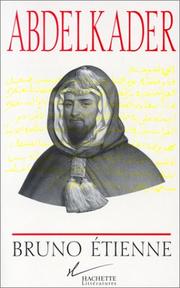
ISBN: 2010158334 9782010158339 Year: 1994 Publisher: Paris : Hachette,
Abstract | Keywords | Export | Availability | Bookmark
 Loading...
Loading...Choose an application
- Reference Manager
- EndNote
- RefWorks (Direct export to RefWorks)
L'émir Abdelkader (1808-1883) est l'un des personnages les plus extraordinaires du XIXe siècle. Héros de la résistance à la colonisation française, il fut le bâtisseur d'un Etat moderne, avant d'être défait par Bugeaud et d'être emmené en captivité en France. C'est Napoléon III qui tiendra finalement la promesse de la France de le laisser repartir en Syrie, où il pourra se consacrer à la mystique, pour être enterré près de son maître Ibn Arabi. Ainsi, ce petit marabout lettré du fin fond de l'Algérie a-t-il inventé l'État moderne, comme il a été le protégé et l'ami de Napoléon III et de Ferdinand de Lesseps, un grand cavalier et un grand amoureux, mais aussi un auteur majeur de l'Islam moderne. Cette biographie originale, exceptionnellement riche et vivante, est le résultat de dix années de recherches et propose un itinéraire spirituel qui nous amène à pénétrer la pensée du plus grand mystique arabe du siècle dernier. -- Publisher description.
Soldiers --- Statesmen --- Biography. --- Mystics --- 297 <65> --- 297 <65> Islamisme. Mahométisme--Algerië --- 297 <65> Islam. Mohammedanisme--Algerië --- Islamisme. Mahométisme--Algerië --- Islam. Mohammedanisme--Algerië --- ʻAbd al-Qādir ibn Muḥyī al-Dīn, --- ʻAbd al-Ḳādir ibn Muḥyī al-Dīn, --- Abd el-Kader, --- ʻAbd al-Ḳādir, --- ʻAbdalqādir ibn Muḥyiddīn, --- Abdulkader al-Jazairi, --- Jazāʼirī, ʻAbd al-Qādir ibn Muḥyī al-Dīn, --- ʻAbd al-Qādir al-Jazāʼirī, --- Abd alʹ-Kadir alzhirskiĭ, --- Jazāʼirī, ʻAbd al-Qādir, --- Jazairi, Abdulkader, --- Alzhirskiĭ, Abd alʼ-Kadir, --- Abdelkader, --- Amīr ʻAbd al-Qādir, --- ʻAbd al-Qâdir al-Djazâʼirî, --- Emir Abdelkader, --- أمير عبد القادر --- جزائري، عبد القادر بن محيي الدين، --- عبد القادر الجزائرى، --- عبد القادر بن محي الدين --- عبد القادر بن محي الدين، --- عبد القادر بن محيي الدبن --- عبد القادر بن محيي الدين --- عبد القادر بن محيي الدين، --- عبد القادر بن محيي الدين, --- عبد القادر، --- عبدالقادر بن محيى الدين، --- عبدالقادر بن محيىى الدين --- Nasreddine Abd-El-Qader Ben Mohieddine El-Hassani, --- Abd-El-Qader Ben Mohieddine El-Hassani, --- El-Hassani, Nasreddine Abd-El-Qader Ben Mohieddine, --- Biography --- Abul-cador, --- Abulcador,
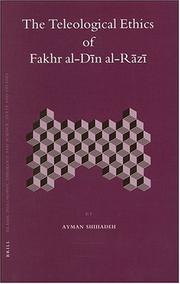
ISBN: 9004149910 9786611398996 1281398993 9047409000 9789047409007 9781281398994 9789004149915 Year: 2006 Publisher: Leiden Boston Brill
Abstract | Keywords | Export | Availability | Bookmark
 Loading...
Loading...Choose an application
- Reference Manager
- EndNote
- RefWorks (Direct export to RefWorks)
Using the most extensive collection hitherto of his published and unpublished writings, this volume provides a comprehensive, in-depth and interdisciplinary study of the ethical philosophy of al-Rāzī (1149-1210), a most outstanding and influential medieval philosopher-theologian. A complex picture emerges, across his philosophical, theological, ethical and juristic works, of a consistent and multi-layered ethical theory. Al-Rāzī departs from classical Ash'arī divine command ethics to develop both a consequentialist ethics of action, which seriously rivals Mu'tazili deontological ethics, and a perfectionist ethics of character. Within the latter framework, he sets out his later, teleological theory of prophecy. The volume includes the text, published for the first time, of one of al-Rāzī's latest and most fascinating works, Censure of the Pleasures of This World , which expresses pronounced moral and epistemological pessimism.
Islamic ethics. --- Islamic philosophy. --- Arabic philosophy --- Muslim philosophy --- Philosophy, Islamic --- Philosophy, Arab --- Muslim ethics --- Religious ethics --- Rāzī, Fakhr al-Dīn Muḥammad ibn ʻUmar, --- Faḫr ad-Dīn ar-Rāzī, --- Fakhr al-Dīn al-Rāzī, --- Fakhr al-Dīn Muḥammad ibn ʻUmar al-Rāzī, --- Fakhr Rāzī, Muḥammad ibn ʻUmar ibn al-Ḥusayn Abū al-Faz̤l, --- Fakhr ud-Dīn Rāzī, --- Fakhraddin Rāzi, --- Fakhre Rāzi, M., --- Fakhruddin Muhammad bin Omar al-Razi, --- Ibn Khaṭīb al-Rayy, --- Muḥammad ibn ʻUmar al-Rāzī, Fakhr al-Dīn, --- Rāzī, Faḫr ad-Dīn, --- Râzı̂, Fahrettin, --- Rāzi, Fakhr, --- Rāzī, Fakhr al-Dīn, --- Rāzī, Fakhr ud-Dīn, --- Rāzi, Fakhraddin, --- Razi, Fakhruddin Muhammad bin Omar, --- Rāzi, M. Fakhre, --- Rozi, Fakhriddin, --- الرازي، فخر الدين محمد بن عمر --- رازي، فخر الدين بن عمر --- رازي، فخر الدين محمد ابن عمر --- رازي، فخر الدين محمد بن عمر --- رازي، فخر الدين محمد بن عمر، --- رازي، فخر الدين محمد بن محمد بن عمد --- رازي، فخرالدين محمد بن عمر --- راضى، فخرالدين محمد عمر --- ررازى، فخرالدين محمد ابن عمر --- فخر الدين الرازي --- فخر الدين محمد بن عمر الرازي --- فخر رازى، محمد بن عمر بن الحسين ابو الفضل, --- Râzî, Fahreddin, --- Razi, Fakhr al-Din Muhammad ibn Umar,
Book
ISBN: 3110497697 3110499517 9783110499513 9783110499544 3110499541 3110496992 9783110496994 3110500558 Year: 2017 Publisher: Berlin/Boston, GERMANY De Gruyter
Abstract | Keywords | Export | Availability | Bookmark
 Loading...
Loading...Choose an application
- Reference Manager
- EndNote
- RefWorks (Direct export to RefWorks)
This text challenges existing writing on 'Abd al-Qādir al-Jazā'irī which divides his life into two juxtaposed phases separated by narratives of conversion: from Francophobia to Francophilia, from militarism to pacifism, from activism to quietism, from Islamism to pluralism, from politics to religion. This work's interdisciplinary approach demonstrates that these narratives cannot be sustained in light of the evidence. Rather, they can be shown to originate in specific historical, cultural, and methodological tendencies within western societies and academies. Drawing on primary materials including archival documents and selections from his own writing, it constructively critiques his reception in the literature while advancing a continuous and contextualised account of his life and ideas. These include the relating of his ethico-religious and jurisprudential concerns to his political decision-making, and a resituating of his mystical writings within a definite moral, epistemological, and political context. By problematising these interpretive issues, this thesis aims at opening new avenues for understanding even as it offers its own solutions. In so doing, this study contributes to discussions on Sufism, political Islam, and east-west relations.
Politicians --- Islam --- History. --- ʻAbd al-Qādir ibn Muḥyī al-Dīn, --- ʻAbd al-Ḳādir ibn Muḥyī al-Dīn, --- ʻAbd al-Ḳādir, --- Abd alʹ-Kadir alzhirskiĭ, --- ʻAbd al-Qâdir al-Djazâʼirî, --- ʻAbd al-Qādir al-Jazāʼirī, --- Abd el-Kader, --- Abd-El-Qader Ben Mohieddine El-Hassani, --- ʻAbdalqādir ibn Muḥyiddīn, --- Abdelkader, --- Abdulkader al-Jazairi, --- Abul-cador, --- Abulcador, --- Alzhirskiĭ, Abd alʼ-Kadir, --- Amīr ʻAbd al-Qādir, --- El-Hassani, Nasreddine Abd-El-Qader Ben Mohieddine, --- Emir Abdelkader, --- Jazāʼirī, ʻAbd al-Qādir, --- Jazāʼirī, ʻAbd al-Qādir ibn Muḥyī al-Dīn, --- Jazairi, Abdulkader, --- Nasreddine Abd-El-Qader Ben Mohieddine El-Hassani, --- أمير عبد القادر --- جزائري، عبد القادر بن محيي الدين، --- عبد القادر الجزائرى، --- عبد القادر بن محي الدين --- عبد القادر بن محي الدين، --- عبد القادر بن محيي الدبن --- عبد القادر بن محيي الدين --- عبد القادر بن محيي الدين، --- عبد القادر بن محيي الدين, --- عبد القادر، --- عبدالقادر بن محيى الدين، --- عبدالقادر بن محيىى الدين --- Intercultural. --- Political Islam. --- Sufism.
Book
ISBN: 1855660113 Year: 1992 Volume: 146 Publisher: London Tamesis Books Limited
Abstract | Keywords | Export | Availability | Bookmark
 Loading...
Loading...Choose an application
- Reference Manager
- EndNote
- RefWorks (Direct export to RefWorks)
Croisades dans la littérature --- Crusades in literature --- Kruistochten in de literatuur --- 860 "12" ALFONSO X EL SABIO --- Civilization, Medieval, in literature --- Spaanse literatuur--?"12"--ALFONSO X EL SABIO --- Alfonso X, King of Castile and Leon --- Saladin Sultan of Egypt and Syria --- -In literature --- Civilization, Medieval, in literature. --- Crusades in literature. --- 860 "12" ALFONSO X EL SABIO Spaanse literatuur--?"12"--ALFONSO X EL SABIO --- Alfonso --- Saladin, --- Al-Ayubi, Salahudeen, --- Ayubi, Salahudeen Al-, --- Ayyūbī, Ṣalāḥ al-Dīn, --- Saladino, --- Salah ad-Din Yusuf, --- Ṣalāḥ al-Dīn al-Ayyūbī, --- Salah al-Din Yusuf ibn Ayyub, --- Salâhaddı̂n Eyyûbı̂, --- Salahudeen Al-Ayubi, --- Selahdînê Eyûbî, --- ايّوبى، يوسف سلطان صلاحالدّين، --- السلطان صلاح الدين --- سلاح الدين، --- صلاح الدين --- صلاح الدين الأيوبي --- صلاح الدين الايوبي، --- صلاح الدين, --- صلاح الدين، --- Afonso --- Alfons, --- Alfonso, --- Alonso, --- Alphonse, --- Alphonse --- Anfós, --- Castille, Alphonse de, --- De Castille, Alphonse, --- In literature. --- Gran conquista de ultramar. --- Caballero del Cisne --- Alfonso X --- Saladin --- ايّوبى، يوسف سلطان صلاحالدّين، --- Aĭi︠u︡biĭ, Salaḣ ad-din, --- Айюби, Салах ад-дин, --- Aĭi︠u︡biĭ, Saloḣiddin, --- Айюби, Салoxиддин, --- Ibn Ai︠u︡b, Salakh ad-din I︠U︡suf, --- Ибн Айюб, Салах ад-дин Юсуф,
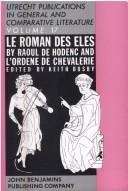
ISBN: 9027221928 9786613424723 9027280231 128342472X 9789027280237 9789027222022 9027222029 9027222029 9789027221926 Year: 1983 Publisher: Amsterdam Benjamins
Abstract | Keywords | Export | Availability | Bookmark
 Loading...
Loading...Choose an application
- Reference Manager
- EndNote
- RefWorks (Direct export to RefWorks)
Scholars and students working on the early courtly and chivalric literature of medieval Europe will have often felt the need for contemporary theoretical material with which to illustrate their arguments about courtesy and chivalry in romances, etc. The present volume, which presents critical editions of the two earliest didactic poems of this kind in the vernacular (both date from the first quarter of the thirteenth century), was conceived partly to fill this need. This book will be of interest not only to specialists in Old French literature, but also to those studying other literatures; bot
Chivalry --- Courtesy --- French poetry --- Knights and knighthood --- Poetry. --- Translations into English. --- Saladin, --- Old French literature --- Ordres de chevalerie --- Poésie française --- Saladin --- Civility --- Courteous behavior --- Courteousness --- Discourteous behavior --- Discourteousness --- Graciousness --- Impoliteness --- Manners --- Polite behavior --- Politeness --- Rudeness --- Ungraciousness --- Etiquette --- Manners and customs --- Orders of knighthood and chivalry --- Civilization, Medieval --- Courtly love --- Crusades --- Feudalism --- Heraldry --- Old French poetry --- Rhétoriqueurs (Group of poets) --- Al-Ayubi, Salahudeen, --- Ayubi, Salahudeen Al-, --- Ayyūbī, Ṣalāḥ al-Dīn, --- Saladino, --- Salah ad-Din Yusuf, --- Ṣalāḥ al-Dīn al-Ayyūbī, --- Salah al-Din Yusuf ibn Ayyub, --- Salâhaddı̂n Eyyûbı̂, --- Salahudeen Al-Ayubi, --- Selahdînê Eyûbî, --- ايّوبى، يوسف سلطان صلاحالدّين، --- السلطان صلاح الدين --- سلاح الدين، --- صلاح الدين --- صلاح الدين الأيوبي --- صلاح الدين الايوبي، --- صلاح الدين, --- صلاح الدين، --- Aĭi︠u︡biĭ, Salaḣ ad-din, --- Айюби, Салах ад-дин, --- Aĭi︠u︡biĭ, Saloḣiddin, --- Айюби, Салoxиддин, --- Ibn Ai︠u︡b, Salakh ad-din I︠U︡suf, --- Ибн Айюб, Салах ад-дин Юсуф,
Book
ISBN: 9004410716 9004410694 Year: 2019 Publisher: Leiden Boston : BRILL,
Abstract | Keywords | Export | Availability | Bookmark
 Loading...
Loading...Choose an application
- Reference Manager
- EndNote
- RefWorks (Direct export to RefWorks)
In Reinventing Jihād, Kenneth A. Goudie provides a detailed examination of the development of jihād ideology from the Conquest of Jerusalem to the end of the Ayyūbids (c. 492/1099–647/1249). By analysing the writings of three scholars - Abū al Ḥasan al Sulamī (d. 500/1106), Ibn ʿAsākir (d. 571/1176), and ʿIzz al-Dīn al-Sulamī (d. 660/1262) - Reinventing Jihād demonstrates that the discourse on jihād was much broader than previously thought, and that authors interwove a range of different understandings of jihād in their attempts to encourage jihād against the Franks. More importantly, Reinventing Jihad demonstrates that whilst the practice of jihād did not begin in earnest until the middle of the twelfth century, the same cannot be said about jihād ideology: interest in jihād ideology was reinvigorated almost from the moment of the arrival of the Franks.
Jihad --- Holy war (Islam) --- Islamic holy war --- Jahad --- Jehad --- Muslim holy war --- War (Islamic law) --- History --- Sulamī, ʻAlī ibn Ṭāhir, --- Ibn ʻAsākir, ʻAlī ibn al-Ḥasan, --- Sulamī, ʻIzz al-Dīn ʻAbd al-ʻAzīz ibn ʻAbd al-Salām, --- Ibn ʻAbd al-Salām, ʻAbd al-ʻAzīz ʻAbd al-Salām ibn Abī al-Qāsim ibn al-Ḥasan, --- Ibn ʻAbd al-Salām, ʻIzz al-Dīn ʻAbd al-ʻAzīz, --- ʻIzz ibn ʻAbd al-Salām, --- Sulamī, Abū Muḥammad ʻIzz al-Dīn ʻAbd al-ʻAzīz ibn ʻAbd al-Salām, --- Sulṭān al-ʻUlamāʼ, --- ابن عبد السلام، عبد العزيز عبد السلام بن أبي القاسم بن الحسن --- سولامي، عز الدين عبد العزيز بن عبد السلام --- سلامي، عز الدين عبد العزيز بن عبد السلام --- سلمي، عاز الدين عبد العزيز بن عبد السلام --- سلمي، عاز الدين عبد العزيز بن عبد السلام، --- سلمي، عز الدين عبد العزيز بن عبد السلام --- سلمي، عز الدين عبد العزيز بن عبد السلام، --- سلمي، عزالدين عبدالعزيز بن عبدالسلام --- سلمي، عزالدين عبدالعزيز بن عبدالسلام، --- عز الدين عبد العزيز بن عبد السلام السلمي
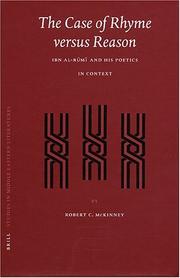
ISBN: 9004130101 9786610859177 9047404394 1280859172 1433705907 9789047404392 9781433705908 9789004130104 9781280859175 6610859175 Year: 2004 Volume: 28 Publisher: Leiden ; Boston Brill
Abstract | Keywords | Export | Availability | Bookmark
 Loading...
Loading...Choose an application
- Reference Manager
- EndNote
- RefWorks (Direct export to RefWorks)
The poetry of the extremely prolific and versatile 'Abbāsid poet Ibn al-Rūmī is examined in this book. Part 1, The Poet, reconstructs the poet's life and times providing the background for Part II, The Poetry, which traces the influences in Ibn al-Rūmī's distinctive poetic style and themes. This provides a glimpse into a rather fluid period in Arabic literary history when the boundary between poetry and prose was becoming increasingly permeable, due to the emergence of the so-called "secretary-poets," and to the prevalence and importance of the munāżarah , or disputation. Part III, The Poem, analyzes the poet's celebrated 282-line poem commemorating the quashing of the Zanj rebellion. The towering architectonics and sophisticated organization of this poem provide an ideal opportunity to explore Ibn al-Rūmī's poetic contribution.
Jalāl al-Dīn Rūmī, --- Balkhī, Jalāl al-Dīn Muḥammad ibn Muḥammad, --- Balkhi, Jalaludin Mohammad, --- Balkhy, Jallal ed-Din Muhammad, --- Celâleddin-i Rûmı̂, --- Celâleddin Rûmı̂, --- D̲jalāl al-Dīn Rūmī, --- Djalâl-od-Dîn Rûmî, --- Dschalaluddin Rumi, --- Dschelal-Eddin Rumi, --- Dschelaladdin Rumi, --- Dschelaleddin Rumi, --- Dzhalaliddin Rumi, --- Dzhaloluddin Balkhii Rumi, --- Dzhaloluddin Rumi, --- Ǧalāladdīn Rūmī, --- Gialâl ad-Dîn Rûmî, --- Jalāl ad-Dīn ar-Rūmī, --- Jalal-e Din Rumi, --- Jalal Eddine Rûmi, --- Jalal-ud-din Rumi, --- Jalāladdīn Rūmī, --- Jalaladdin Rumi, --- Jalālauddīna Rūmī, --- Jalálu-ʼd-ʼDín Muhammad i Rúmí, --- Jalāluddīn Balk̲h̲ī Rumī, --- Jalaluddin Mohammad Rumi, --- Jalāluddīn Muḥammad Balk̲h̲ī Rūmī, --- Jalaluʼddin Rumi, --- Jaláluddin Rumi, --- Jalaludin Mohammad Balkhi, --- Jallal ed-Din Muhammad Balkhy, --- Jallal Molavi Rumi, --- Jaloliddin Rumiy, --- Jaloluddin Muḣammadi Rumī, --- Jelaluddin Rumi, --- Jolalud-Din Rumi, --- Mavlono Jaloluddin Muḣammadi Rumī, --- Mevlâna, --- Mowlavi, --- Roumi, Tzalalountin, --- Rum, --- Rūmī, --- Rūmī, Jalāl al-Dīn, --- Rumi, Jalal-e Din, --- Rumi, Jalaladdin, --- Rūmī, Jalālauddīna, --- Rumi, Jaláluddin, --- Rumi, Jallal Molavi, --- Rumi, Mawlana, --- Rumi, Mevlana Jaláluddin, --- Rumiĭ, Zhaloliddin, --- Rumiy, Jaloliddin, --- Rumy, Jelaleddin, --- Tzalalountin Roumi, --- Ŷalāl al-Dīn Rūmī, --- Zhaloliddin Rumiĭ, --- Джалолуддин Руми, --- Джалолуддин Балхии Руми, --- بلخى، مولانا جلال الدين محمد بن محمد --- جلال الدين بلخى رومى، --- جلال الدين رومي، --- جلال الدين رومى، --- جلال الدين رومى، --- رومي، مولانا جلال الدين، --- رومى --- Criticism and interpretation. --- Jalal al-Dan Rama, Maulana --- Criticism and interpretation --- Mawlavī, Jalāl al-Dīn Muḥammad ibn Muḥammad, --- Mowlavi, Jalaloddin Mohammad ibn Mohammad, --- بلخى، مولانا جلال الدين محمد بن محمد, --- مولوى, جلال الدين محمد بن محمد, --- رومى، مولانا جلال الدين، --- رومى, --- Abbasids. --- Lyric. --- Caliphs --- Jalal al-Din Rumi,
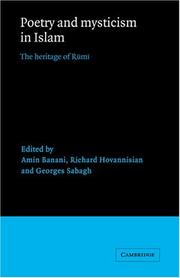
ISBN: 052145476X Year: 1994 Publisher: Cambridge Cambridge University press
Abstract | Keywords | Export | Availability | Bookmark
 Loading...
Loading...Choose an application
- Reference Manager
- EndNote
- RefWorks (Direct export to RefWorks)
Jalal al-Din Rumi Maulana --- -Criticism and interpretation --- -Congresses --- Jalāl al-Dīn Rūmī, --- Balkhī, Jalāl al-Dīn Muḥammad ibn Muḥammad, --- Balkhi, Jalaludin Mohammad, --- Balkhy, Jallal ed-Din Muhammad, --- Celâleddin-i Rûmı̂, --- Celâleddin Rûmı̂, --- D̲jalāl al-Dīn Rūmī, --- Djalâl-od-Dîn Rûmî, --- Dschalaluddin Rumi, --- Dschelal-Eddin Rumi, --- Dschelaladdin Rumi, --- Dschelaleddin Rumi, --- Dzhalaliddin Rumi, --- Dzhaloluddin Balkhii Rumi, --- Dzhaloluddin Rumi, --- Ǧalāladdīn Rūmī, --- Gialâl ad-Dîn Rûmî, --- Jalāl ad-Dīn ar-Rūmī, --- Jalal-e Din Rumi, --- Jalal Eddine Rûmi, --- Jalal-ud-din Rumi, --- Jalāladdīn Rūmī, --- Jalaladdin Rumi, --- Jalālauddīna Rūmī, --- Jalálu-ʼd-ʼDín Muhammad i Rúmí, --- Jalāluddīn Balk̲h̲ī Rumī, --- Jalaluddin Mohammad Rumi, --- Jalāluddīn Muḥammad Balk̲h̲ī Rūmī, --- Jalaluʼddin Rumi, --- Jaláluddin Rumi, --- Jalaludin Mohammad Balkhi, --- Jallal ed-Din Muhammad Balkhy, --- Jallal Molavi Rumi, --- Jaloliddin Rumiy, --- Jaloluddin Muḣammadi Rumī, --- Jelaluddin Rumi, --- Jolalud-Din Rumi, --- Mavlono Jaloluddin Muḣammadi Rumī, --- Mevlâna, --- Mowlavi, --- Roumi, Tzalalountin, --- Rum, --- Rūmī, --- Rūmī, Jalāl al-Dīn, --- Rumi, Jalal-e Din, --- Rumi, Jalaladdin, --- Rūmī, Jalālauddīna, --- Rumi, Jaláluddin, --- Rumi, Jallal Molavi, --- Rumi, Mawlana, --- Rumi, Mevlana Jaláluddin, --- Rumiĭ, Zhaloliddin, --- Rumiy, Jaloliddin, --- Rumy, Jelaleddin, --- Tzalalountin Roumi, --- Ŷalāl al-Dīn Rūmī, --- Zhaloliddin Rumiĭ, --- Джалолуддин Руми, --- Джалолуддин Балхии Руми, --- بلخى، مولانا جلال الدين محمد بن محمد --- جلال الدين بلخى رومى، --- جلال الدين رومي، --- جلال الدين رومى، --- جلال الدين رومى، --- رومي، مولانا جلال الدين، --- رومى --- Criticism and interpretation --- Congresses. --- Mawlavī, Jalāl al-Dīn Muḥammad ibn Muḥammad, --- Mowlavi, Jalaloddin Mohammad ibn Mohammad, --- بلخى، مولانا جلال الدين محمد بن محمد, --- مولوى, جلال الدين محمد بن محمد, --- رومى، مولانا جلال الدين، --- رومى,
| Listing 1 - 10 of 64 | << page >> |
Sort by
|

 Search
Search Feedback
Feedback About UniCat
About UniCat  Help
Help News
News